LGBTQI+
LGBTQI+

Death Book ll
Death Book is dedicated to Bruce LaBruce’s archive of rarely published or previously unpublished work characterized by morbid fascinations. Here photographs challenge the viewer to explore what lies beneath the veneer of Western society.
The book brings this body of work together for the first time, combining LaBruce’s performances, actions, film production stills and photography that explicitly outline his obsessions, with never-before exhibited archival works from projects including Hustler White, Otto; or Up with Dead People, and L.A. Zombie.
The book is edited as loosely connected vignettes, characterised by horror, the carnage accelerated rather than overcome, questioning existing values, hierarchies, and perceptions of good and evil. A variety of faces and body parts appear, including those of actors Francois Sagat and Tiger Tyson, model/actor Tony Ward, artists Kembra Pfahler and Slava Mogutin, and cameos by legendary figures such as performance artist Ron Athey, musician/artists Genesis P-Orridge and Lady Jaye, artist Dash Snow, actor Brad Renfro, Asia Argento and Bruce LaBruce himself.
The Death Book also introduces the art director Max Siedentopf, who has designed the book as a paraphrase of the Bible, punctured with three bullet holes, piercing the book from front to back. The book contains an introduction by artist, photographer and writer Slava Mogutin.
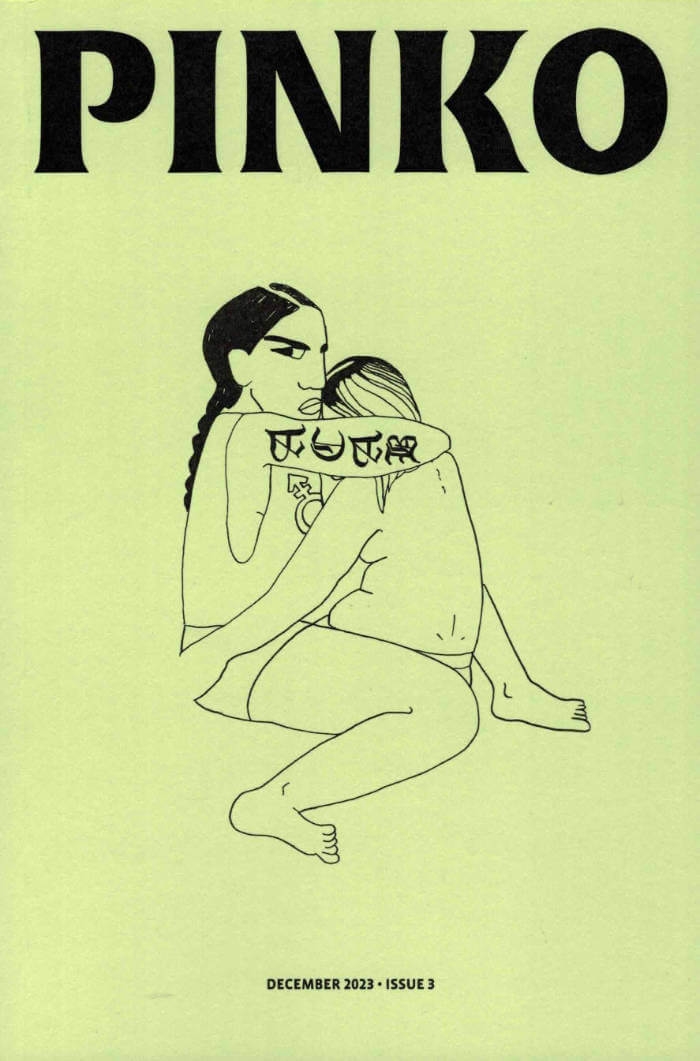
Pinko Magazine Issue 3
This third print issue contains Pinko's editorials on trans eradication and Palestinian survival, essays about black lesbian sex writing, consent and its limits, the end of sexual liberalism, and a presentation of imbrication theory, plus a roundtable on political violence, an interview from Pinko's book After Accountability, and a memorial to the gay socialist publisher Jeffrey Escoffier. Illustrations by the artist KT Pe Benito grace this issue.

Pinko Magazine Issue 2
This second print issue contains an interview with the abolitionist organizer Stevie Wilson, essays about nineties nightlife in support of queer intimacies in Santiago, Chile, Barbz against pinkwashing, a translation of the communization theorist Gilles Dauvé’s latest work on the reactionary tendencies in the sexual liberation movement in Weimar Germany, a missive by Samuel R. Delany, a ritual script by Lou Cornum, a meditation on intersex experiences as the untheorized marrow of trans liberation, and more. There are also world-building drawings by the artist Chitra Ganesh throughout.

JJ – Tartine-moi et autres textes
JJ brings together articles by cultural critic, auto/biographer, and lesbian icon Jill Johnston, translated into French for the first time, as well as texts, poems and drawings by Pauline L. Boulba, Aminata Labor, Nina Kennel and Rosanna Puyol.
Jill Johnston (1929-2010) was a dance critic, performer, writer, and feminist and lesbian activist. Her books include Marmalade Me (1971), Lesbian Nation (1973), Gullibles Travels (1974) and numerous articles in The Village Voice.
Texts by Jill Johnston; contributions by Pauline L. Boulba, Aminata Labor, Nina Kennel, Rosanna Puyol.
Translated from the English (American) by Pauline L. Boulba, Aminata Labor, Nina Kennel, Rosanna Puyol.
Graphic design: Sophie Demay & Maël Fournier-Comte (In the Shade of a Tree).

When Monsters Speak: A Susan Stryker Reader
Susan Stryker is a foundational figure in trans studies. When Monsters Speak showcases the development of Stryker’s writing from the 1990s to the present. It combines canonical pieces, such as “My Words to Victor Frankenstein,” with her hard to find earlier work published in zines and newsletters. Brought together, they ground Stryker’s thought in 1990s San Francisco and its innovative queer, trans, and S/M cultures. The volume includes an introduction by editor McKenzie Wark, who highlights Stryker’s connections to developments in queer theory, media studies, and autotheory while foregrounding Stryker’s innovative writing style and scholarly methods. When Monsters Speak is an authoritative and essential collection by one of the most important and influential intellectuals of our time.

The My Comrade Anthology
The My Comrade Anthology collects pages from past issues of My Comrade selected by Linda Simpson, printed in a substantial 256-page volume on newsprint.
My Comrade was an underground gay culture zine that set itself apart from the deluge of Xeroxed zines popping up in New York in the late 1980s and early 1990s. Through parody of both mainstream tabloid magazines and the self-serious gay press, a campy and ironic sensibility, and radical left sympathies and sloganeering, My Comrade captured the zeitgeist of the gay downtown scene. Publishing 11 issues between 1987 and 1994, and three issues since, My Comrade documents the last years of underground gay culture before marriage equality and representation at elite levels of American society became the primary drivers of gay politics and aesthetic production. My Comrade was briefly revived from 2004 to 2006, and again on the occasion of the exhibition “My Comrade Magazine: Happy 35th Gay Anniversary” at Howl! in 2022.
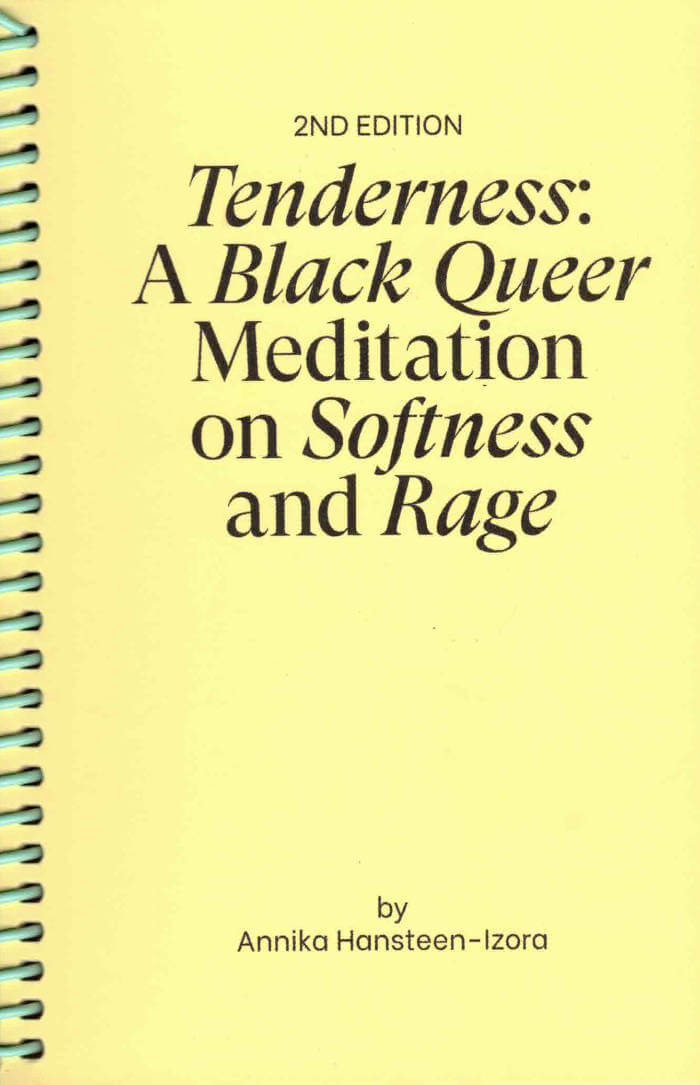
Tenderness A Black Queer Meditation On Softness And Rage (Second Edition)
Tenderness is back with a second edition and new title, Tenderness: A Black Queer Meditation on Softness and Rage. This second edition has all the original content from the first edition with more to explore, including a new preface from author Annika Hansteen-Izora.
What would it mean if tenderness could hold a simultaneous existence of joy and rage? How to call on tenderness as a practice of love, rather than a regurgitation of white supremacy? Author and writer Annika Hansteen-Izora explores answers in Tenderness: A Black Queer Meditation on Softness and Rage. A meditation, critical inquiry, and invitation to expand our imaginations on meanings of tenderness, this piece calls into question conceptions of tenderness that are rooted in desirability, anti-Blackness and white supremacy, and instead unfolds the potentials of tenderness as a tool, a balm, a healing agent, and a question to lean into.
Size: 5" x 7.5", 72 pages, spiral bound. Edition of 750.
Self published by Co—Conspirator Press with the support of Feminist Center for Creative Work. Written by Annika Hansteen-Izora. Copy Edited by Aliyah Blackmore. Designed and Illustrated by MJ Balvanera. Risograph printed by Neko Natalia. Bound by South Gate Bindery.
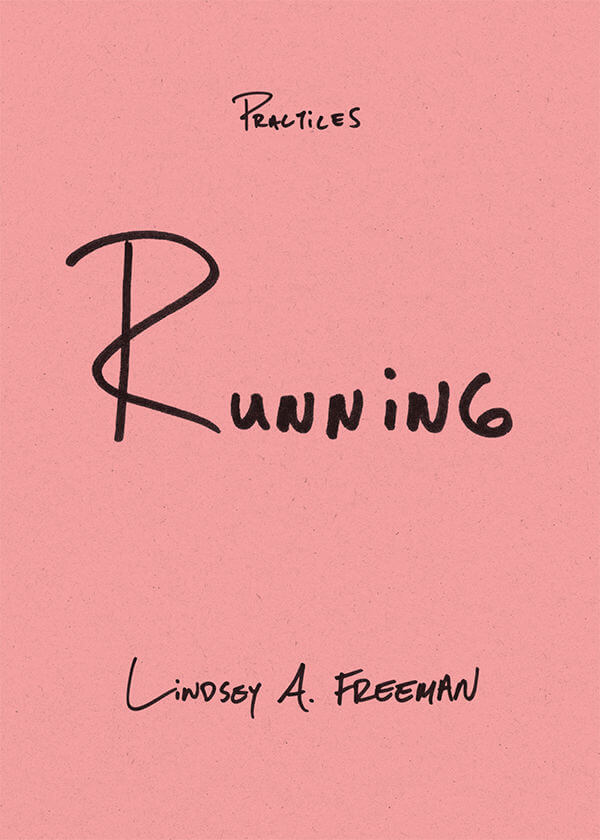
Running
In Running, former NCAA Division I track athlete Lindsey A. Freeman presents the feminist and queer handbook of running that she always wanted but could never find. For Freeman, running is full of joy, desire, and indulgence in the pleasure and weirdness of having a body. It allows for a space of freedom—to move and be moved. Through tender storytelling of a lifetime wearing running shoes, Freeman considers injury and recovery, what it means to run as a visibly queer person, and how the release found in running comes from a desire to touch something that cannot be accessed when still. Running invites us to run through life, legging it out the best we can with heart and style.

Trash
Trash interweaves the voices of three women with lived connections to the municipal garbage dump of Ciudad Juárez, Mexico.
Aguilar Zéleny's Trash shows the complexities of survival and joy, love and violence for three women: a teenager abandoned by her guardian at the dump, a scientist doing research on the residents of the dump, and a transwoman living nearby who is the matriarch of a group of sex workers.
Each one of the characters navigates family, abandonment, power, jealousy, greed, and multiple taboos around sexuality and gender violence. Their stories are linked by geography and by ideas of waste and abandonment.
As Aguilar Zéleny explores these territories in her book, she asks crucial questions: who is seen as disposable and why? How do women find their own means of survival and joy in the midst of a perilous sociopolitical context? What does it mean to live a life in a time of austerity and extreme violence? Trash is a critical intervention in Mexican literature.
Translated by J.D. Pluecker
Lambda Literary Award Finalist for Transgender Fiction
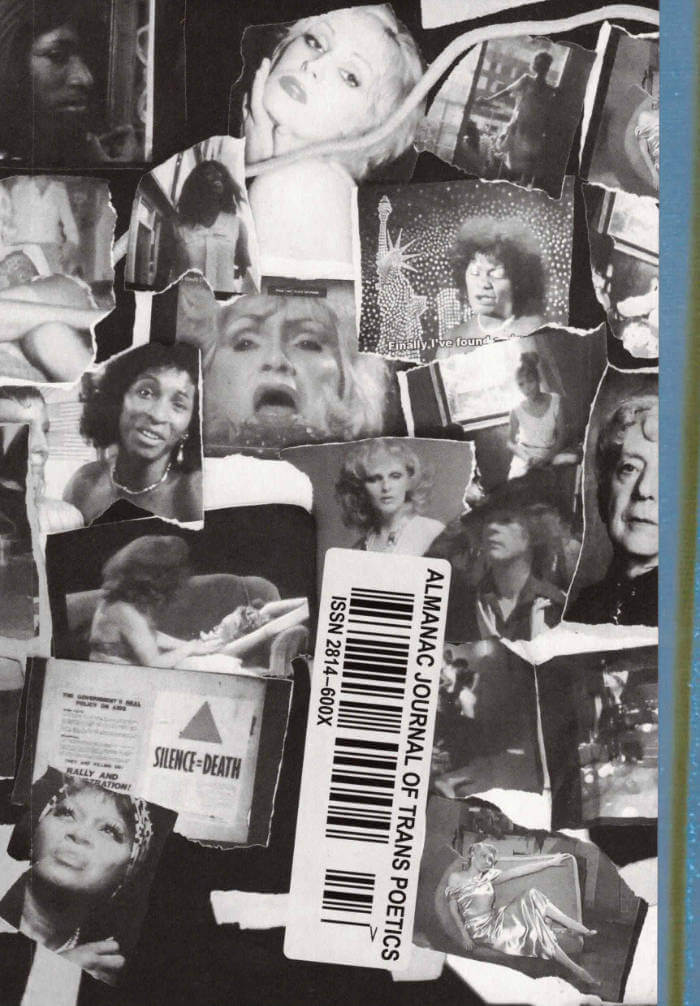
Almanac Journal of Trans Poetics: ISSUE #3 Cinema
In this issue, you’ll find different angles and takes on trans cinema. Featuring 22 contributors — the issue got pieces on gothic cinema, growing up as a TV kid in the 90s, trans femme film favs, cripness in Cronenberg’s work, love letters to the intimacy of the cinema hall and much more!
Sit back and get comfortable and let this third release take you on a journey through interviews, essays, comics, YouTube playlists, top favourite movie lists and beautiful, powerful film stills. This one is not to be missed!

Secession / Charlie Prodger
Charlie Prodger works across moving image, writing, sculpture, drawing and printmaking. Through the prism of queer subjectivity, her work explores intertwined relations between the body, landscape, language, technology and time. To accompany her exhibition and the presentation of the complete film trilogy—Stoneymollan Trail, BRIDGIT, and SaF05—a book with a substantial essay by Sarah Hayden is released in Secession’s publication series.
The London-based author and associate professor of literature and visual culture analyzes the significance of voice and voiceover in Prodger’s video works. For the book, the artist has created a series of image pairings of production photos and video stills from the final part of the trilogy, SaF05.

Basta Now. Women, Trans & Non-binary in Experimental Music
Basta Now. Women, Trans & Non-binary in Experimental Music is a non-academic essay by French poet, novelist and music enthusiast Fanny Chiarello. It’s also the first book to be published by Permanent Draft, an all-female record label and micro-press founded by Chiarello & musician Valentina Magaletti, dedicated to promoting contemporary female, non-binary and transgender artists.
Basta Now is essentially a huge (yet admittedly not definitive) overview of 2,371 womxn in the global experimental sound & music scene. It’s been writ ten in playful and compelling prose and stylishly presented with photos, illustrations, and discographies.
“This book has nothing against men, it’s just not about them” (Fanny Chiarello)

Theorem
This tale about seduction, obsession, family, and the confines of capitalism is one of director Pier Paolo Pasolini's most fascinating creations, based on his transcendent film of the same name.
Theorem is the most enigmatic of Pier Paolo Pasolini's four novels. The book started as a poem and took shape both as a work of fiction and a film, also called Theorem, released the same year. In short prose chapters interspersed with stark passages of poetry, Pasolini tells a story of transfiguration and trauma.
To the suburban mansion of a prosperous Milanese businessman comes a mysterious and beautiful young man who invites himself to stay. From the beginning he exercises a strange fascination on the inhabitants of the house, and soon everyone, from the busy father to the frustrated mother, from the yearning daughter to the weak-willed son to the housemaid from the country, has fallen in love with him. Then, as mysteriously as he appeared, the infatuating young man departs. How will these people he has touched so deeply do without him? Is there a passage out of the spiritual desert of modern capitalism into a new awakening, both of the senses and of the soul? Only questions remain at the end of a book that is at once a bedroom comedy, a political novel, and a religious parable.

all this here, now.
The haunting and intimate account of a group of young adults trying to come to terms with a friend’s premature death.
Ananke’s death rips a huge hole in the lives of their friends. A member of the group reflects on their shared mourning, remembering times past: childhood holidays and idyllic summers, as well as tensions and arguments. Ananke is a constant, enigmatic presence, yet remains mysterious and out of reach. When the numbness of trauma becomes too much to bear, the group impulsively takes a road trip to dig up Ananke’s ashes and bring them back to the sea by the hut where Ananke used to live.
Stern’s contemplative, ethereal yet vivid prose brings heightened sensibility to the present moment and the obliquity of memory. Flouting gender pronouns and written entirely in lowercase, all this here, now. is a vision of a more collectively grounded fiction where ‘we’ is stronger than ‘I’. The effect is as meditative as it is compulsively engaging, delivered in Damion Searls’s distinctive translation.
Winner of the Swiss Book Prize
Winner of the Prisma Prize for LGBTQI+ Literature
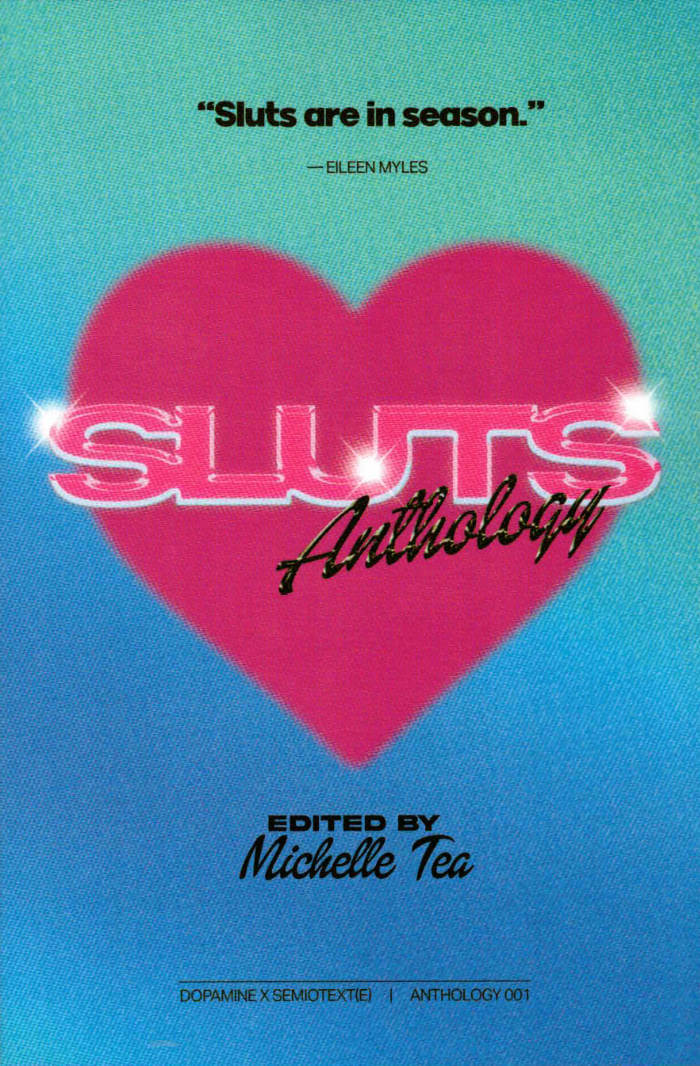
Sluts: Anthology
What it means to be sexually promiscuous in contemporary American culture, edited by cult-favorite author Michelle Tea.
SLUTS, the first publication from vulgarian queer publisher DOPAMINE BOOKS, is an exploration of what it means to be sexually promiscuous in contemporary American culture. Featuring personal essays, spilled secrets, fiction, memoir, and experimental works, SLUTS asks writers and readers to investigate the many ways the notion of the slut impacts our inner and outer lives, as a threat or an identity, a punishment or an aspiration, a lifestyle, an aesthetic, a philosophy and rallying cry. From hideous and terrifying first encounters to postapocalyptic polyamory, from unionizing sex workers to backstage tableaux of sex and drugs and rock and roll, SLUTS's stories probe the liberating highs and abject lows of physical abandon. Featuring work from performer Miguel Gutierrez, hailed by the New York Times as “an artist of ordered excess”; former Nylon magazine editor in chief Gabrielle Korn; award-winning author Brontez Purnell; Whore of New York author Liara Roux; National Book Critics Circle Award winner Jeremy Atherton Lin; and a host of additional artists and writers, SLUTS reveals the knowledges provoked by a dalliance with desire.
Contributors
DL Alvarez, Vera Blossom, Chloe Caldwell, Cristy Road Carrera, Sam Cohen, Tom Cole, Lydia Conklin, jimmy cooper, Lyn Corelle, Jenny Fran Davis, Cyrus Dunham, Hedi El Kholti, Robert Glück, Miguel Gutierrez, Gary Indiana, Taleen Kali, Cheryl Klein, Gabrielle Korn, Jeremy Atherton Lin, Nate Lippens, Meredith Maran, Carta Monir, Amanda Montell, Carely Moore, Bradford Nordeen, Baruch Porras-Hernandez, Kamala Puligandla, Brontez Purnell, Liara Roux, Andrea Sands, Daviel Shy, Jen Silverman, Anna Joy Springer, Laurie Stone, McKenzie Wark, Zoe Whittall.
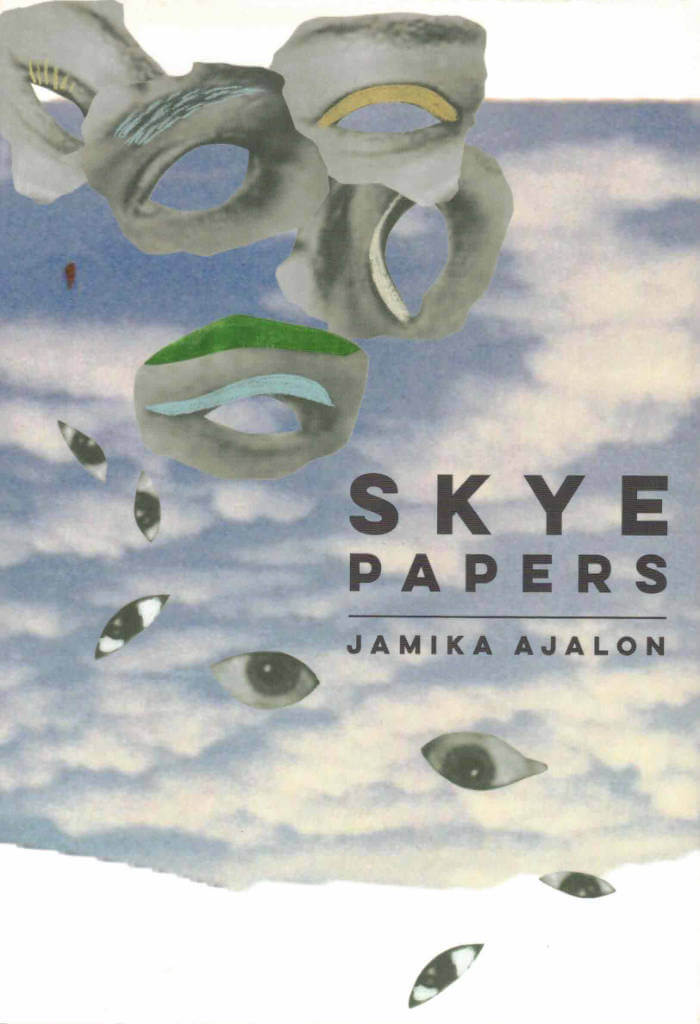
Skye Papers
A dreamy and experimental portrait of young Black artists in the 1990s London underground scene, whose existence is threatened by the rise of state surveillance.
Twentysomething and restless, Skye flits between cities and stagnant relationships until she meets Scottie, a disarming and disheveled British traveler, and Pieces, an enigmatic artist living in New York. The three recognize each other as kindred spirits—Black, punk, whimsical, revolutionary—and fall in together, leading Skye on an unlikely adventure across the Atlantic. They live a glorious, subterranean existence in 1990s London: making multimedia art, throwing drug-fueled parties, and eking out a living by busking in Tube stations, until their existence is jeopardized by the rise of CCTV and policing.
In fluid and unrelenting prose, Jamika Ajalon's debut novel explores youth, poetry, and what it means to come terms with queerness. Skye Papers is an imaginative, episodic group portrait of a transatlantic art scene spearheaded by people of color—and of the fraught, dystopian reality of increasing state surveillance.

Playboy
The prequel to Love Me Tender, narrating Debré's transformation from affluent career woman to broke single lesbian and writer.
I see all her beauty, I see the beauty of women. I see my own body, new. I tell myself there are so many things that are possible.
First published in France in 2018, Playboy is the first volume of Constance Debré's renowned autobiographical trilogy that describes her decision, at age forty-three, to abandon her marriage, her legal career, and her bourgeois Parisian life to become a lesbian and a writer.
The novel unfolds in a series of short, sharp vignettes. The narrator's descriptions of her first female lovers—a married woman fifteen years older than her, a model ten years her junior—are punctuated by encounters with her ex-husband, her father, and her son.
As Debré recently told Granta: “It was a bit like Saint Augustine and his conversion. In the same week, I had sex with a girl and I had the feeling that I could write. I had this incredible feeling that I could catch things, that life was there to be caught.”
Looking at the world through fresh eyes, the narrator of Playboy questions everything that once lay beneath the surface of her well-managed life. Laconic, aggressive, and radically truthful, she examines gender and marriage, selfishness and sacrifice, money and family, even the privilege inherent in her downward mobility.
Writing her way toward her own liberation, Debré chronicles the process that made her one of the most brilliant, important French writers today.

Notice
A classic queer text of trauma, written by one of the most talented novelists of her generation.
Published by Doubleday in 1994, Heather Lewis's chilling debut novel took place on the northeastern equestrian show-riding circuit, to which Lewis herself belonged in her teens. Expelled from boarding school, its fifteen-year-old narrator moves numbly through a world of motel rooms, heroin, dyke love, and doped horses. Kirkus Reviews found it “brutal, sensual, honest, seductive … a powerful debut,” while the New York Times found the book “grating and troublesome … it's difficult to imagine a more passive specimen.”
Almost immediately, Lewis began writing Notice, a novel that moves even further into dark territory. The teenaged narrator Nina begins turning tricks in the parking lot of the train station near the Westchester County home of her absent parents. She soon falls into a sadomasochistic relationship with a couple. Arrested, she's saved by a counselor and admitted to a psychiatric facility. But these soft forms of control turn out to be even worse. Writing in the register of an emotional fugue state, Notice's helpless but all-knowing narrator is as smooth and sharp as a knife.
Rejected by every publisher who read it during Lewis's life, Notice was eventually published by Serpent's Tail in 2004, two years after her death. The book, long out of print, emerged as a classic queer text of trauma, written by one of the most talented novelists of her generation.

A Short History of Trans Misogyny
An accessible, bold new vision for the future of intersectional trans feminism, called "one of the best books in trans studies in recent years" by Susan Stryker.
Why are trans women the most targeted of LGBT people? Why are they in the crosshairs of a resurgent anti-trans politics around the world? And what is to be done about it by activists, organizers, and allies?
A Short History of Transmisogyny is the first book-length study to answer these urgent but long overdue questions. Combining new historical analysis with political and activist accessibility, the book shows why it matters to understand trans misogyny as a specific form of violence with a documentable history. Ironically, it is through attending to the specificity of trans misogyny that trans women are no longer treated as inevitably tragic figures. They emerge instead as embattled but tenacious, locked in a struggle over the meaning and material stakes of gender, labor, race, and freedom.
The book travels across bustling port cities like New York, New Orleans, London and Paris, the colonial and military districts of the British Raj, the Philippines, and Hawai'i, and the lively travesti communities of Latin America.
The book shows how trans femininity has become legible as a fault line of broader global histories, including colonial government, the sex work industry, the policing of urban public space, and the line between the formal and informal economy. This transnational and intersectional approach reinforces that trans women are not isolated social subjects who appear alone; they are in fact central to the modern social world.

Tar Hollow Trans: Essays
"I've lived a completely ordinary life, so much that I don't know how to write a transgender or queer or Appalachian story, because I don't feel like I've lived one.... Though, in searching for ways to write myself in my stories, maybe I can find power in this ordinariness."
Raised in southeast Ohio, Stacy Jane Grover would not describe her upbringing as "Appalachian." Appalachia existed farther afield—more rural, more country than the landscape of her hometown.
Grover returned to the places of her childhood to reconcile her identity and experience with the culture and the people who had raised her. She began to reflect on her memories and discovered that group identities like Appalachian and transgender are linked by more than just the stinging brand of social otherness.
In Tar Hollow Trans, Grover explores her transgender experience through common Appalachian cultural traditions. In "Dead Furrows," a death vigil and funeral leads to an investigation of Appalachian funerary rituals and their failure to help Grover cope with the grief of being denied her transness. "Homeplace" threads family interactions with farm animals and Grover's coming out journey, illuminating the disturbing parallels between the American Veterinary Association's guidelines for ethical euthanasia and the World Professional Association for Transgender Health's guidelines for transgender care.
Together, her essays write transgender experience into broader cultural narratives beyond transition and interrogate the failures of concepts such as memory, metaphor, heritage, and tradition. Tar Hollow Trans investigates the ways the labels of transgender and Appalachian have been created and understood and reckons with the ways the ever-becoming transgender self, like a stigmatized region, can find new spaces of growth.

Joan of Arkansas
Joan of Arkansas is an election-season closet drama about climate catastrophe, divine gender expression, the instructions of angels, and heavenly revelation relayed via viral video. Fifteen-year-old Joan has been tasked by God (They/Them) to ensure that Charles VII (R–Arkansas) adopts radical climate policy and wins his bid as the Lord’s candidate to become the president of the United States. Arkansas is flooding, the West is burning, and borders are closed: “Heaven or / internet—it’s / hard to be / good.”
Winner of the 2023 Whiting Award for Drama.
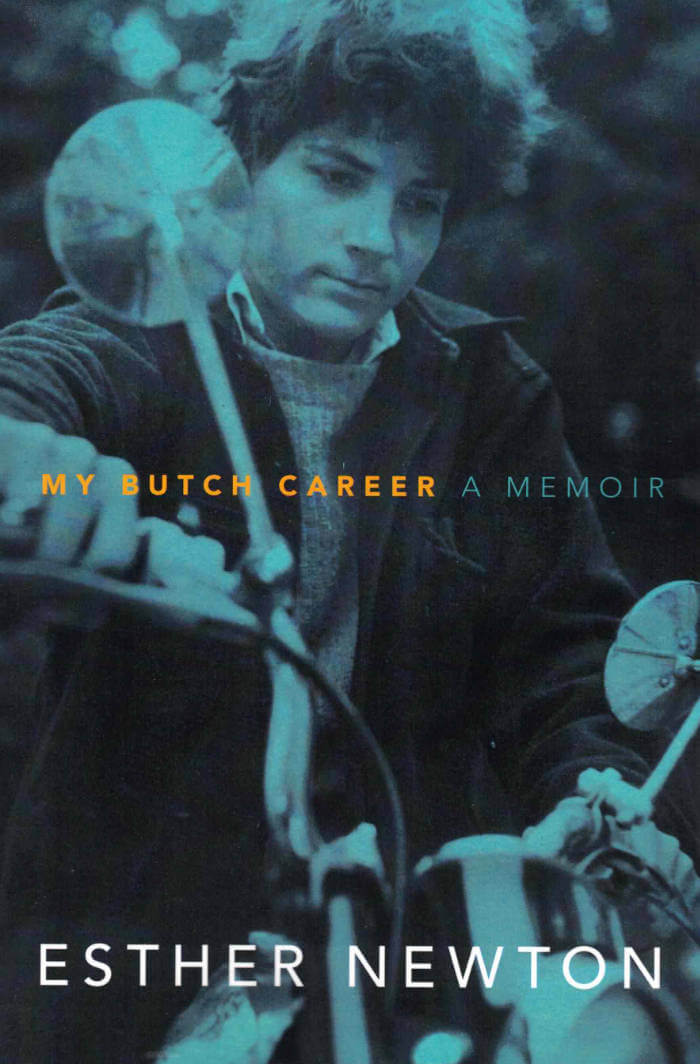
My Butch Career: A Memoir
In My Butch Career Newton tells the compelling, disarming, and at times sexy story of her struggle to write, teach, and find love, all while coming to terms with her identity during a particularly intense time of homophobic persecution in the twentieth century.
During her difficult childhood, Esther Newton recalls that she “became an anti-girl, a girl refusenik, caught between genders,” and that her “child body was a strong and capable instrument stuffed into the word ‘girl.’” Later, in early adulthood, as she was on her way to becoming a trailblazing figure in gay and lesbian studies, she “had already chosen higher education over the strongest passion in my life, my love for women, because the two seemed incompatible.”
Newton recounts a series of traumas and conflicts, from being molested as a child to her failed attempts to live a “normal,” straight life in high school and college. She discusses being denied tenure at Queens College—despite having written the foundational Mother Camp—and nearly again so at SUNY Purchase. With humor and grace, she describes the influence her father Saul's strong masculinity had on her, her introduction to middle-class gay life, and her love affairs—including one with a well-known abstract painter and another with a French academic she met on a spur-of-the-moment trip to Mexico and with whom she traveled throughout France and Switzerland. By age forty, where Newton's narrative ends, she began to achieve personal and scholarly stability in the company of the first politicized generation of out lesbian and gay scholars with whom she helped create gender and sexuality studies.
Affecting and immediate, My Butch Career is a story of a gender outlaw in the making, an invaluable account of a beloved and influential figure in LGBT history, and a powerful reminder of just how recently it has been possible to be an openly queer academic.
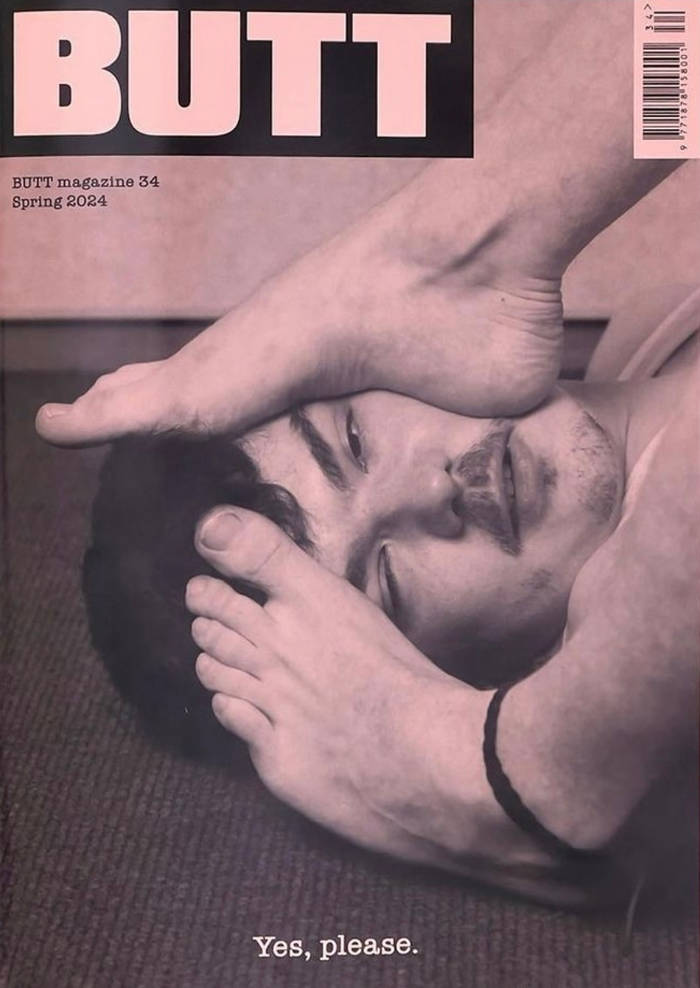
BUTT magazine 34
This full-frontal 34th issue of BUTT has plenty of queer ringleaders, free speech and skin. Inside, find interviews with Hollywood doll Hari Nef, young gay historian Jason Okundaye, fashion phenom Jean-Pierre Blanc, literary outlaw Constance Debré and dark room connoisseur Frank Rediess of Berlin's Ficken 3000. It's stuffed even further with horny photo series by Kuba Ryniewicz and Paul Mpagi Sepuya, plus lots of spit-swapping, Arabic sexting and bottom architecture. Yes, please.
Spring 2024
From ass to architecture to ass architecture, this full-frontal issue of BUTT has plenty of queer ringleaders, free speech and cock. Yes, please.
JASON OKUNDAYE, gay historian shows crack
By Douglas Greenwood and Ajamu X
HARI NEF, Hollywood doll is literally one
By Zak Stone and Collier Schorr
DR. EVAN GOLDSTEIN, hole-care guru
By Michael Bullock and Marcelo Krasilcic
GRAY WIELEBINSKI & ASA SERESIN, transatlantic husbands
By Kuba Ryniewicz
FRANK REDIESS, dark room nocturne ft. Ficken 3000 boss
By Matt Lambert
MOUTHFUL, spit-swapping delight
By Chris Curreri
MARWAN KAABOUR, Levantine lad and sext specialist
By Evan Moffitt and Daniel Riera
HOTSHOTS, studio fucking
By Paul Mpagi Sepuya
CONSTANCE DEBRÉ, best-selling dyke
By Andrew Pasquier and Raphael Chatelain
PLAY, sublime foot fun
By Kuba Ryniewicz
JEAN-PIERRE BLANC, fashion phenom on naked island
By Gert Jonkers, Marc Turlan and Raphaël Chatelain
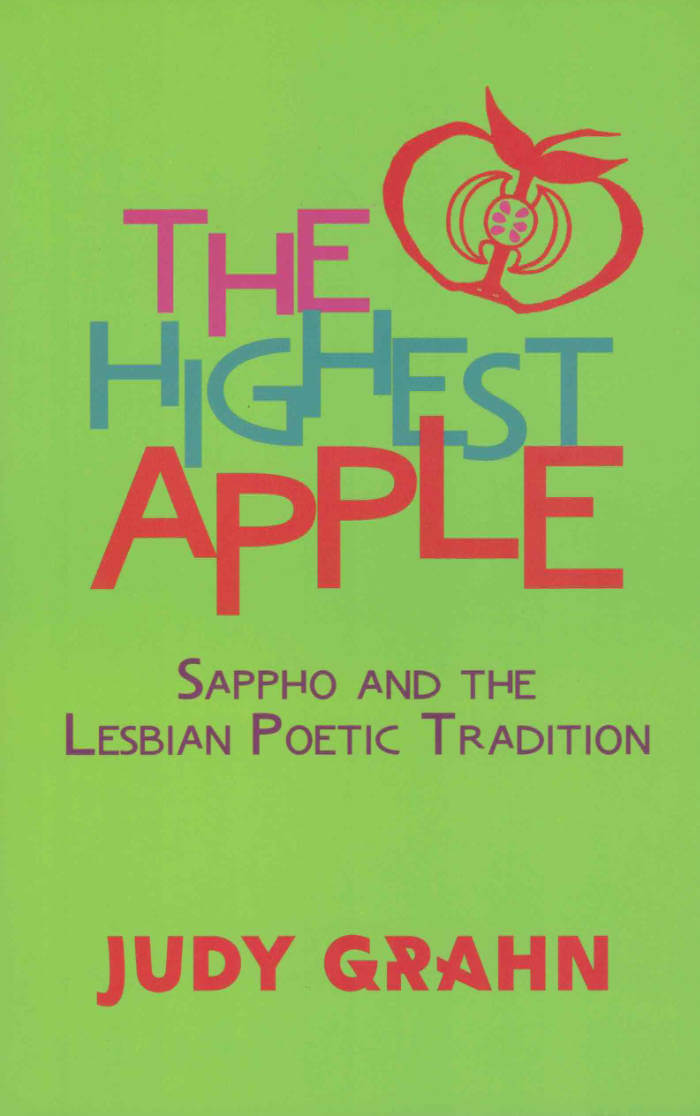
The Highest Apple: Sappho and the Lesbian Poetic Tradition
In 1985, Judy Grahn boldly declared that lesbians have a poetic tradition and mapped it from Sappho to the present day in the groundbreaking book, The Highest Apple. In this new and updated edition of The Highest Apple: Sappho and the Lesbian Poetic Tradition, Grahn revisits the original text with her characteristic ferocious intellect, passion for historical research, careful close readings, and dynamic storytelling. Grahn situates poetry by Sappho, Emily Dickinson, Amy Lowell, H.D., Gertrude Stein, Adrienne Rich Paula Gunn Allen, Audre Lorde, Pat Parker, and Olga Broumas as central to lesbian culture—and more radically as central to society as a whole.
This new edition of The Highest Apple: Sappho and the Lesbian Poetic Tradition includes Grahn’s in depth analysis of poetic work by her friend and comrade Pat Parker and suggests a transactional approach to poetry as uncovering layers of the self. Grahn assembled this text in conversation with two younger lesbian poets, Alicia Mountain and Alyse Knorr, demonstrating the continued relevance and dynamism of The Highest Apple for contemporary readers. A new introduction by Grahn, a foreword by Alyse Knorr, and editor notes by Alicia Mountain along with six responses by contemporary poets Donika Kelly, Kim Shuck, Serena Chopra, Zoe Tuck, Saretta Morgan, and Khadijah Queen highlight the on-going significance of The Highest Apple to readers, writers, and thinkers.